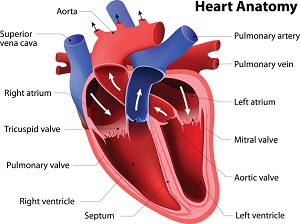Homeopathic Clinic ;Blood Pressure , A to Z , Part -2.
We have discussed about low blood pressure in our part 1. In this article we will talk about high blood pressure known as Hypertension.
List of contents:
- High blood pressure
- Type of hypertension.
- Symptoms.
- Diagnosis.
- Causes
High Blood Pressure or Hypertension.
Researchers and doctors have set certain range of blood pressure as healthy blood pressure. Our blood pressure reading show us how much blood is passing through our blood vessels and how much resistance blood meets while the heart is pumping blood.
All mankind have two types of cholesterol. HDL and LDL. They are found in our blood. LDL is known as ” bad cholesterol”. For details read our article “Let us know our Cholesterol, Part -1 “ It travels with our blood and stick to the walls of our arteries making them narrow, and less blood flow The through arteries. In such case, our hart put more power to pump the blood to reach to all parts of body. The narrow arteries increase resistance and heart apply more pressure. This position is known as High Blood Pressure or Hypertension. If this situation persist for a long period of time, it can cause health issues including heart disease .
Usually hypertension develops over a long period of time without any symptoms, and can cause damage to our blood vessels, brain, heart, eyes and kidneys.
Types of Hypertension:
Heart specialists have divided hypertension in to two types. Each type has different cause:
- Primary hypertension: —- It is also called as ” Essential Hypertension “. It takes a long time to develop with no symptoms. Most people have this type of hypertension. Researchers are trying to know the causes, they agreed on some factors which play a role to increase this Primary hypertension:
1 ; Genes. — Some people are genetically victim of primary hypertension. It could be from gene mutation or genetic abnormality transferred from their parents.
2: Physical changes: —– Any change in the body can lead to primary hypertension. For example, for some reasons, changes in kidney function may upset the body and natural balance of salts and fluid, and can cause primary hypertension.
3 : Environment – — Living in a dusty, humid climate, unhealthy life style , poor diet , and no physical activity will lead to weight problems . Obesity is a main cause of hypertension. - Secondary Hypertension:
Secondary hypertension can occurs very quickly and can be more sever than primary hypertension. There are many conditions playing roll to occur this hypertension:
1 – Kidney diseases.
2 – Disturbed sleep.
3 – Heart disease since birth.
4 – Problem with thyroid.
5 – Use of drugs.
6 – Medications’ side effects.
7 – Alcohol abuse.
8 – Certain endocrine tumors.
9 – Adrenal gland problems. Masses of tissue producing a liquid which tightens blood vessels.
Symptoms:
Hypertension develop slowly and take a longer time to reach at a sever stage and symptoms appear. Symptoms include:
1 – Headache.
2 – Nose bleeding.
3 – Shortness of breath.
4 – Dizziness.
5 – Flushing.
6 – Chest pain/stress.
Diagnosis:
The best way to know your hypertension is to get regular blood pressure reading. Keep a written record of such reading . It will be a great help for your doctor to diagnose .
High blood pressure readings:
- When you check your blood pressure, you will find two numbers:
- Systolic pressure. This is first or top number, indicating the pressure in your arteries when heart beats and pumps out blood. A healthy blood pressure reading for adults is less than 120/80 mm Hg.
- Elevated : Systolic number 120 to 129 mm Hg, and Diastolic number is less than 80 mm Hg.
- Stage 1 hypertension: The top number is between 130 to 139 mm Hg , and bottom number is between 80 — 89 mm Hg.
- Stage 2 : The upper number is 140 mm Hg or higher, The bottom number is 90 mm Hg or higher.
- Hypertension. The upper number over 180 mm Hg or higher, and bottom number is 120 mmHg.
.
If symptoms remain , you must consult your doctor immediately. Your doctor can advise you for following tests:
1 – Urine test.
2 – Lipid profile test.
3 – Heart activity test (ECG).
4 – Ultra sound of your kidney and heart.
Your doctor will examine all above tests and can begin treating your hypertension . Early treatment will reduce the risk of lasting damage.
source: HealthLine
Causes
Several factors play role in developing hypertension including:
- Smoking.
Obese. - Too much salt in diet.
- Lack of physical activity.
- Too much alcohol consumption. more than 1 to 2 dinks per day.
- Older age.
- Stress.
- Genetics.
- Family history of hypertension.
- Adrenal and thyroid disorder.
- Kidney disease.
- Disturb sleep.
source: WebMD
Continued part – 3
